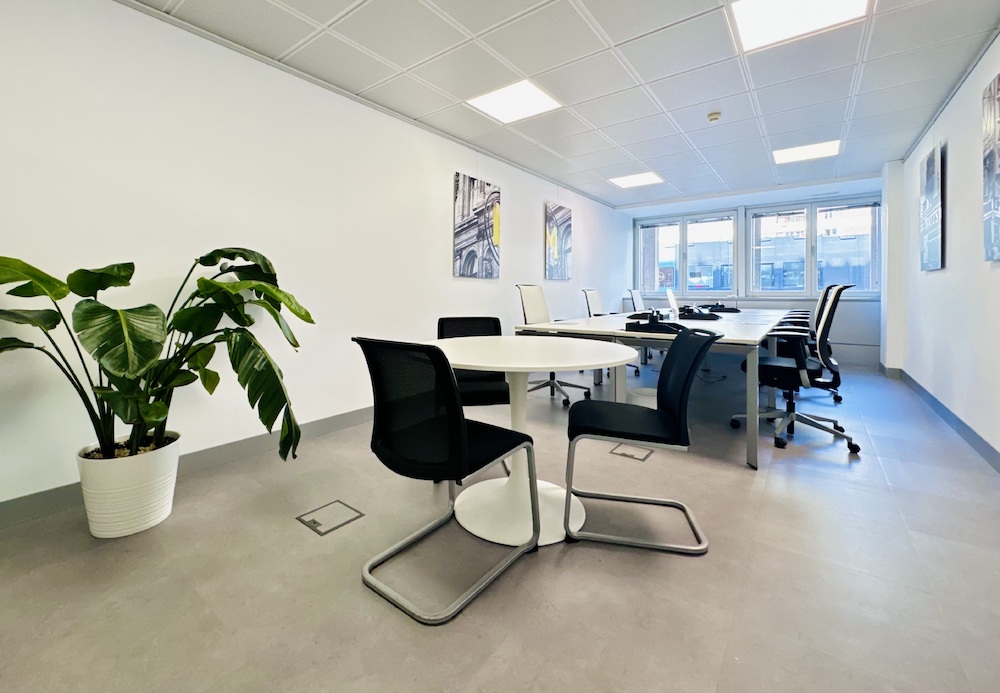In today’s business world, the way we work has evolved significantly. The irruption of digital technologies, globalisation and changes in work dynamics have given rise to a new paradigm: collaborative and flexible work. In this context, coworking spaces have emerged as an innovative and effective solution, offering an attractive alternative for entrepreneurs, freelancers and small companies looking for a dynamic and adaptable environment to develop their projects.
The concept of coworking goes beyond sharing a physical space. It is a philosophy that promotes collaboration, creativity and the creation of professional communities. Instead of working in the solitude of a home office or a noisy café, coworking spaces provide a professional environment with all the resources necessary to foster productivity and growth.
From Ibercenter, which has several centres in Madrid, including coworking spaces in Castellana, we would like to share in this article our opinions on this concept and its importance in the growth of companies.

The importance of coworking in entrepreneurship
One of the main advantages of coworking for entrepreneurs is the possibility of being surrounded by a diverse and dynamic community. This multicultural and multidisciplinary environment encourages the exchange of ideas, knowledge and experiences, which in turn can lead to opportunities for collaboration and unexpected synergies.
Instead of being isolated in a traditional office, the entrepreneur in a coworking space has the possibility to interact with professionals from different sectors, from technology developers to marketing experts, which enriches their perspective and helps them find creative solutions to the problems they face.
In addition, coworking spaces offer a flexibility that is crucial for entrepreneurs, especially in the early stages of their projects. The ability to adapt the workspace to the changing needs of the business, without the financial and contractual commitments of a conventional office, allows entrepreneurs to concentrate on what really matters: the development and growth of their project. This flexibility also extends to working hours, as many coworking spaces are open 24/7, allowing entrepreneurs to work when their creativity and productivity are at their peak.
Another key aspect is access to resources and services that might otherwise be costly or inaccessible to a small business or individual entrepreneur. From state-of-the-art technology to equipped meeting rooms to administrative and logistical support, coworking spaces provide a complete professional environment that facilitates the day-to-day life of the entrepreneur.
This infrastructure not only improves operational efficiency, but also projects an image of seriousness and professionalism to potential customers and partners.
The network of contacts that can be built in a coworking space is undoubtedly one of the most valuable benefits. The daily interactions and networking events organised in these spaces give entrepreneurs the opportunity to expand their professional network organically. Meeting other entrepreneurs, investors and mentors in the same place where you work can open doors and generate business opportunities that would otherwise be difficult to reach.
Last but not least, there is the motivational and emotional aspect. Entrepreneurship can be a lonely and uncertain journey, but working in a coworking space reduces that feeling of isolation.
The energy and vitality of a collaborative environment, where others are also striving to achieve their goals, can be a source of inspiration and constant support. This sense of community can be crucial in maintaining motivation and focus in difficult times, helping entrepreneurs to persevere and overcome the obstacles they encounter along the way.
What is a coworking space?
A coworking space is a shared workplace where professionals from different sectors and disciplines come together to carry out their work activities. Unlike traditional offices, these spaces are designed to foster collaboration, creativity and the exchange of ideas among their members. Equipped with all the necessary amenities, from desks and meeting rooms to advanced technological services, coworking spaces offer a flexible and dynamic environment that adapts to the needs of entrepreneurs, freelancers, small businesses and large corporations.
The origin of the coworking concept dates back to the beginning of the 21st century, when Brad Neuberg, a software developer from San Francisco, coined the term and opened the first coworking space in 2005. Neuberg sought to create a place where freelancers could work together in an environment that combined the freedom of freelance work with the structure and community of a traditional office. His idea was simple but revolutionary: to provide a shared space that promoted social and professional interaction, thus facilitating growth and innovation.
Since then, the concept of coworking has evolved and expanded globally. What started as a small initiative in San Francisco has become a worldwide movement, with thousands of coworking spaces operating in cities around the world.
The popularity of these spaces has grown exponentially, driven by the rise of remote working, the rise of entrepreneurship and the need for flexible working solutions in an increasingly globalised and digital economy.
In Spain, coworking spaces have gained great relevance in recent years, especially in large cities such as Madrid and Barcelona. These spaces not only offer a physical place to work but have also become meeting points for innovation and collaboration between professionals from different sectors. In addition, the growing acceptance of teleworking and the search for work-life balance have reinforced the demand for coworking spaces, which provide a professional environment without the restrictions of a traditional office.
The essence of coworking lies in its ability to create vibrant, connected communities where knowledge and resources are constantly shared. Members of a coworking space not only share a workplace, but also a mindset and collaborative approach that can lead to new business opportunities, joint projects and accelerated professional growth.
In this sense, coworking spaces or the offices for rent in Castellana represent much more than a passing trend; they are a response to the changing needs of modern professionals and a fundamental part of the contemporary entrepreneurial ecosystem.

What are its main characteristics?
Coworking spaces are distinguished by a number of characteristics that make them unique and highly attractive to a variety of professionals. Firstly, flexibility is one of the fundamental pillars of these environments. Coworking spaces allow users to choose when and how they work, offering adaptable contracts ranging from daily use to monthly or annual memberships. This flexibility is ideal for entrepreneurs and freelancers who need to adjust their schedules and space requirements according to the evolution of their projects.
Another key feature is the modern and well-equipped infrastructure. Coworking spaces are designed to meet all the technological and logistical needs of contemporary professionals. This includes high-speed internet access, printers, scanners, meeting rooms equipped with the latest audio-visual technology and comfortable common areas.
In addition, many coworking spaces offer additional services such as administrative support, mail and package reception, and call handling, allowing entrepreneurs to concentrate on their work without worrying about operational details.
Community is another essential aspect that defines coworking spaces. Unlike traditional offices, coworking spaces are designed to encourage interaction and collaboration among their members.
Regular networking events, workshops, talks and social activities are organised to facilitate the exchange of ideas and the creation of synergies. This networking can not only open doors to new business opportunities, but also provides a supportive and motivating environment, vital for those who are self-employed.
Strategic location is a feature that cannot be overlooked. Coworking spaces are often located in central or easily accessible areas, which is convenient for both users and their clients and partners. This accessibility translates into time savings and greater efficiency in daily commuting, as well as projecting a professional and modern image of the company.
The design of the space also plays a crucial role in the coworking experience. These spaces are carefully designed to be attractive and functional, combining bright, open areas with private areas that allow for concentration and privacy when needed. The modern aesthetics and welcoming atmosphere contribute to a stimulating and pleasant working environment, which can have a positive impact on users’ productivity and well-being.
Finally, the diversity of the professionals who use coworking spaces is one of their greatest strengths. Entrepreneurs, freelancers, startups and employees of large companies can all live together in the same space, each with their own projects and objectives, but all sharing the same collaborative environment. This diversity enriches the coworking experience, bringing different perspectives and fostering a spirit of innovation and creativity.
Save on your monthly expenses
One of the most significant advantages of working in a coworking space is the cost savings. For many entrepreneurs and small businesses, the costs associated with renting a traditional office space can be prohibitive. Coworking spaces offer a cost-effective alternative that allows access to first-class facilities without the need to commit to long-term contracts or make large upfront investments.
In a coworking space, costs are shared among all members, which results in a considerable reduction of individual expenses. Instead of paying rent for a private office, utilities, internet, furniture and maintenance, coworking users pay a fixed fee that covers all these aspects.
This all-inclusive pricing structure provides greater financial predictability, which is especially valuable for start-ups and freelancers who need to carefully manage their budget.
In addition, coworking spaces eliminate the need to invest in equipment and technology. Most coworking spaces are equipped with everything needed to work efficiently, from high-speed internet to printers and fully equipped meeting rooms. This access to shared resources not only reduces costs, but also ensures that users always have the latest and most efficient tools at their disposal without having to spend extra money to purchase and maintain them.
Cost savings are not only limited to the financial sphere. Coworking spaces also save time, an invaluable resource for any entrepreneur. Being centrally located and well communicated, these spaces facilitate daily commuting and reduce time wasted on long journeys.
In addition, having administrative support services, mail and parcel reception, and call handling within the same space frees professionals from operational tasks that can consume a significant part of their working day, allowing them to focus on more productive and strategic activities.
Collaborative environment
The promotion of networking is one of the fundamental pillars of the collaborative environment that characterises coworking spaces. In these environments, the exchange of ideas and professional interaction is not only possible, but actively encouraged, creating constant opportunities for valuable connections. Working in a coworking space means being surrounded by a diverse community of professionals, each with their own skills, experiences and perspectives, which facilitates the creation of a dynamic and enriching network of contacts.
The very structure of coworking spaces is designed to encourage networking. Common areas, such as cafeterias, break rooms and shared work areas, act as natural meeting points where professionals can converse, share ideas and collaborate informally. This configuration removes the typical barriers of a conventional office, fostering an atmosphere of openness and accessibility that encourages dialogue and cooperation.
In addition, many coworking spaces organise events and activities specifically geared towards networking. These can range from networking breakfasts and lunches to workshops, seminars and talks with experts in different areas. Participating in these events not only offers the opportunity to meet other professionals and potential collaborators, but also to keep up to date with the latest trends and developments in different sectors, thus enriching the knowledge and perspective of each participant.
Networking in coworking spaces is not limited to casual interaction or organised events. The culture of collaboration and mutual support in these environments also translates into joint projects, strategic alliances and unexpected synergies.
Physical proximity and a willingness to help and share knowledge facilitate the identification of collaboration opportunities that can result in mutual benefits. For example, a graphic designer may find a web developer with whom to launch a joint project, or an entrepreneur may discover a potential business partner with complementary skills.
The value of networking in coworking spaces also lies in the diversity of the community. By bringing together professionals from different industries and specialties, coworking spaces create an ecosystem where innovative solutions and fresh perspectives are more likely to be found. Interacting with people from different backgrounds can inspire new ideas and approaches that might not emerge in a more homogenous environment.
In addition, coworking spaces often have digital platforms and tools that facilitate networking. From mobile apps to forums and internal networks, these resources allow members to connect and communicate beyond the physical space, further expanding the possibilities for collaboration and support. These platforms may also include member directories, where professionals can easily find and contact other users with skills or interests relevant to their projects.
Conclusion
In conclusion, coworking spaces have established themselves as an innovative and effective solution for 21st century professionals. They offer much more than just a place to work; they are environments designed to foster productivity, collaboration and personal and professional growth. Flexible schedules, access to advanced resources, reduced distractions and the promotion of healthy habits create an optimal environment for efficient work and overall wellbeing.
In addition, these spaces provide a rich community of support where advice, mentoring, incubation and acceleration programmes help entrepreneurs develop and scale their projects.
The possibility of establishing direct contact with investors and taking advantage of visibility and marketing opportunities amplifies the reach and impact of projects. The business synergies forged in these environments allow professionals to benefit from the diversity and complementary skills of their peers, leading to fruitful collaborations and strategic alliances.
In an increasingly dynamic and competitive world of work, coworking spaces represent an answer to the changing needs of professionals and businesses. By combining flexibility, resources, support and a vibrant community, coworking spaces not only facilitate day-to-day work, but also foster growth and innovation.
So choosing a coworking space is not only a practical decision, but a smart strategy for any professional looking to maximise their potential and achieve success in a collaborative and stimulating environment. In short, coworking spaces are much more than a fad; they are the future of work.






